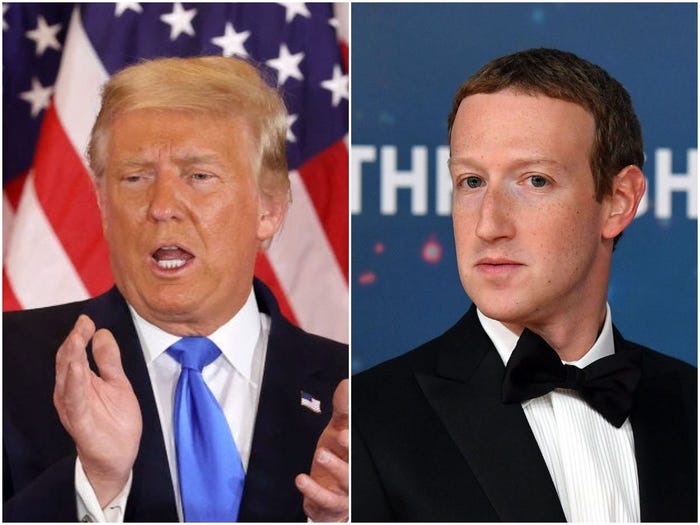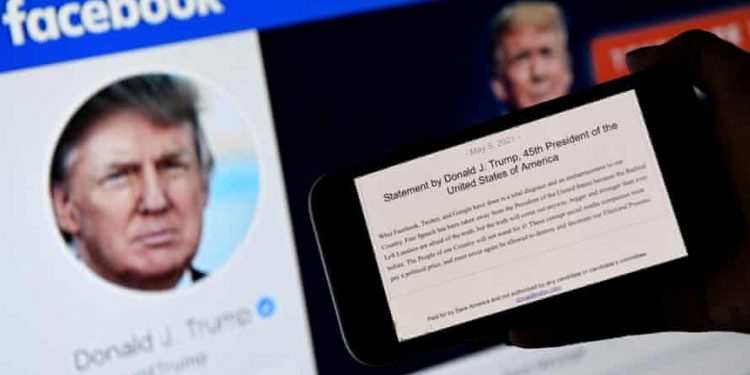Facebook said Friday that it plans to suspend former president Donald Trump for two years following his comments inciting violence in the wake of the Capitol insurrection on Jan. 6. The social media giant will reinstate him only if “the risk to public safety has receded,” according to a blog post on the company’s website.

Facebook’s new policy refers specifically to the behavior of public figures during periods of heightened violence or unrest, according to the blog post. Facebook says it will now initiate a series of time-bound suspensions for violators, starting with a one-month suspension, and look to experts to help reevaluate the situation at the end of each period.
The announcement, part of a set of responsesto the Facebook Oversight Board’s recommendations in May regarding its suspension of the former president, is likely to have major implications for how the platform treats controversial public figures going forward.
In ruling on whether the social network should reinstate Trump’s account on its service, the largely independent, Facebook-funded Oversight Board said the social media company was correct in suspending him in the moment but lacked a clear rationale for keeping him off the platform indefinitely.
The company’s announcement Friday is an attempt to clarify Trump’s penalty and make the procedures of the powerful social network, which is used by 3.45 billion people globally on a monthly basis, appear less arbitrary and opaque to the public. It is also the first major test of how a nongovernment watchdog might act as a check on Facebook’s power.
“We know that any penalty we apply — or choose not to apply — will be controversial,” said Nick Clegg, Facebook’s vice president of global affairs, in the post. “There are many people who believe it was not appropriate for a private company like Facebook to suspend an outgoing President from its platform, and many others who believe Mr. Trump should have immediately been banned for life. We know today’s decision will be criticized by many people on opposing sides of the political divide — but our job is to make a decision in as proportionate, fair and transparent a way as possible, in keeping with the instruction given to us by the Oversight Board.”
Trump said in an emailed statement the ruling was an insult to the people who voted for him last year. Facebook “shouldn’t be allowed to get away with this censoring and silencing, and ultimately, we will win,” he added. “Our Country can’t take this abuse anymore!”
He added a personal swipe at Facebook CEO Mark Zuckerberg in a second statement: “Next time I’m in the White House there will be no more dinners, at his request, with Mark Zuckerberg and his wife. It will be all business!” he said.
A Trump adviser who spoke on the condition of anonymity to discuss internal discussions with the former president described him as “mad as hell” about the Facebook ban and looking for ways to attack the company and Zuckerberg.
Some welcomed the extended ban on Trump. But Facebook’s criticssaid the two-year ban didn’t go far enough, and noted that the timing could allow Trump to return to the platform before the 2024 election. That would allow him not only to rebuild a passionate audience, but to use the service for the fundraising, list-building, and event promotion that is key to political campaigns.
“He will be back just in time to load a hundred million into Facebook ads,” said Joan Donovan, research director of the Technology and Social Change Project at the Shorenstein Center on Media, Politics and Public Policy at Harvard’s Kennedy School. “Even if he doesn’t run, he is a huge bank for the GOP, so he will be a shot caller.”
Facebook on Friday stopped short of saying it would comply with another board recommendation to publish a full public accounting of its role in fomenting the events that took place on Jan. 6. Instead, the company said it had created a partnership to exchange data about what took place on the platform during the election with 20 academic researchers, and that it would continue to cooperate with law enforcement. The researchers are planning to make their findings public.
The company also said it would no longer automatically give politicians a pass when they break the company’s hate speech rules, a major reversal after years of criticism that it was too deferential to influential people during the Trump presidency.
Since the 2016 election, the company has applied a test to political speech that weighs the newsworthiness of the content against its propensity to cause harm. Now, the company will throw out the first part of the test and will no longer consider newsworthiness as a factor.















